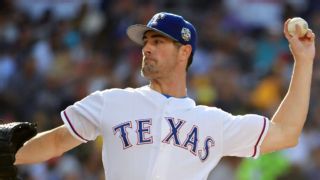|
Is Cole Hamels the best pitcher of his generation? The easy answer is no, considering Hamels reached the majors in 2006 and Clayton Kershaw reached the majors in 2008, making them contemporaries and close enough in age -- Hamels is four years older -- to be of the same generation.  It does seem, however, that Hamels has been underappreciated when compared to other peers like Felix Hernandez, Justin Verlander, Zack Greinke, Max Scherzer and David Price. While Hamels has been a terrific pitcher for a long time and has received plenty of media coverage, I'm not sure I ever thought of Hamels as quite in their class. Maybe that's a reflection of those pitchers all having won Cy Young Awards. Hamels not only has never won one, but has never been a major factor in the voting, with no first-place votes on his résumé. This season is certainly shaping up as his best opportunity to win: In a wide-open race, he's 13-4 with a 2.80 ERA, leading AL pitchers in WAR and ranking third in ERA, sixth in strikeouts and 10th in innings. The Texas Rangers are 18-7 when he starts and 28-9 in his starts since they acquired him in July 2015. It does seem, however, that Hamels has been underappreciated when compared to other peers like Felix Hernandez, Justin Verlander, Zack Greinke, Max Scherzer and David Price. While Hamels has been a terrific pitcher for a long time and has received plenty of media coverage, I'm not sure I ever thought of Hamels as quite in their class. Maybe that's a reflection of those pitchers all having won Cy Young Awards. Hamels not only has never won one, but has never been a major factor in the voting, with no first-place votes on his résumé. This season is certainly shaping up as his best opportunity to win: In a wide-open race, he's 13-4 with a 2.80 ERA, leading AL pitchers in WAR and ranking third in ERA, sixth in strikeouts and 10th in innings. The Texas Rangers are 18-7 when he starts and 28-9 in his starts since they acquired him in July 2015.
With the Rangers holding a comfortable lead over the Seattle Mariners and Houston Astros, it appears Hamels will be headed for his seventh postseason, which includes a World Series title with the Philadelphia Phillies in 2008 when he went 4-0 with a 1.80 ERA. That leads to another question: Is Hamels a potential Hall of Famer? At 32 years old, he has 134 wins, well short of traditional Hall of Fame standards, and his career WAR of 50.0 is still short as well, but he's still going strong and is headed for his ninth straight season of 30-plus starts. If he ages well, he would seem to have a chance. Except there's one problem here. Hall of Famer voters are extremely tough on electing starting pitchers. Check out this chart: Mike Mussina is 19th in pitching WAR since 1900 and has received little support. Curt Schilling is 21st, one of the all-time great postseason pitchers, and has received little support. Kevin Brown won 211 games and has a higher career WAR than many Hall of Fame starters and received just 12 votes his one year on the ballot. None of those three won a Cy Young Award, so maybe that's one reason why (although Brown probably should have won in 1996 and 1998). David Cone is squeezed between Juan Marichal and Don Drysdale in career WAR and did win a Cy Young and yet received fewer votes than Mark Grace, quickly dismissed because he didn't win 200 games, let alone 300. The trouble is, by these standards, no starter who began his career after 2000 is going to get elected. Heck, at this moment in time, even Kershaw is essentially Johan Santana -- amazing peak, but with just 125 career wins even he presumably still needs more longevity. The interesting recent inductee was John Smoltz, who made it with just 211 career wins and a lower career WAR than Mussina, Schilling or Brown. Several of the active pitchers certainly have an excellent chance to get up to his career totals in wins and WAR with a few more good seasons. Smoltz sailed in on the first ballot -- yes, he was part of all those great Braves teams (although Schilling won more titles) -- as it seems voters gave him a lot of extra credit for his three-plus seasons as a closer when he saved 154 games. What needs to happen is that voters eventually reassess their standards. Starters throw fewer innings now, make a few less starts per season and are thus involved in fewer decisions. In some ways, 200 wins should perhaps be considered the new 300. Roy Halladay will be a good test case, a pitcher with an amazing peak (two Cy Youngs, two more runner-up finishes), but "only" 203 career wins. In my book, he's a Hall of Famer. His career value exceeds many Hall of Fame pitchers as is; just because he didn't hang on to win a few more games shouldn't disqualify an otherwise strong candidate. In Hamels' case, winning a Cy Young Award will be a huge boost. Say the next three years he averages 15 wins per season and accumulates an additional 15 WAR. Now he's up to 179 wins (plus however many more he adds this season) and 65 career WAR. Now we'd be looking at a guy with a good case. Hernandez, Verlander and Greinke are in similar positions, and already have Cy Young trophies on their mantles. As with Hamels, none are locks at this point, but are building strong cases if they continue to pitch well. Of course, Hamels already has something none of those three have: a World Series ring. With a chance to add another one.
|
